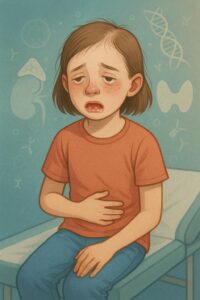Autoimmune Polyendocrine Syndrome Type 1 (APS-1) (APECED) is a rare inherited autoimmune disease in which the immune system attacks multiple parts of the body, particularly the endocrine glands. It’s caused by a mutation in the AIRE gene, which is responsible for teaching the immune system to ignore the body’s own tissues.
APECED is defined by a classic triad of:
-
Chronic mucocutaneous candidiasis (persistent yeast infections of the mouth, skin, or nails)
-
Hypoparathyroidism (low parathyroid hormone levels, leading to calcium imbalance)
-
Adrenal insufficiency (Addison’s disease)
Other organs and systems can also be affected over time, including the skin, thyroid, pancreas, and reproductive system.

